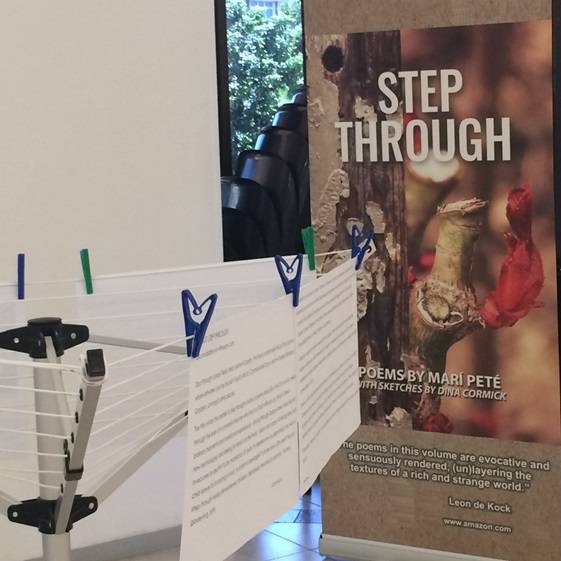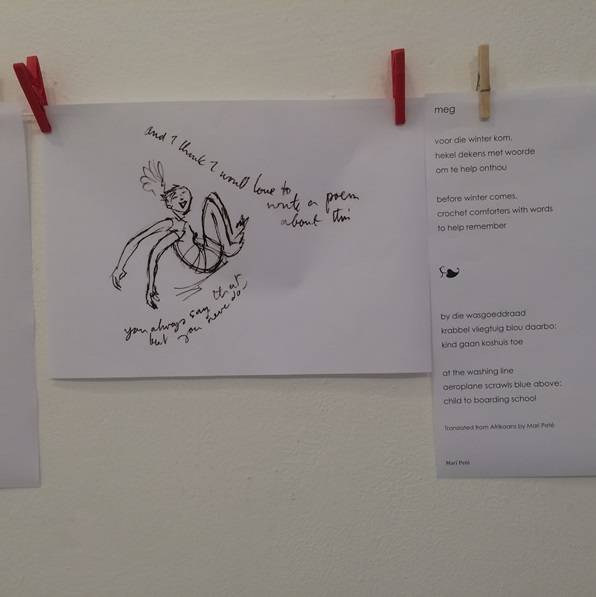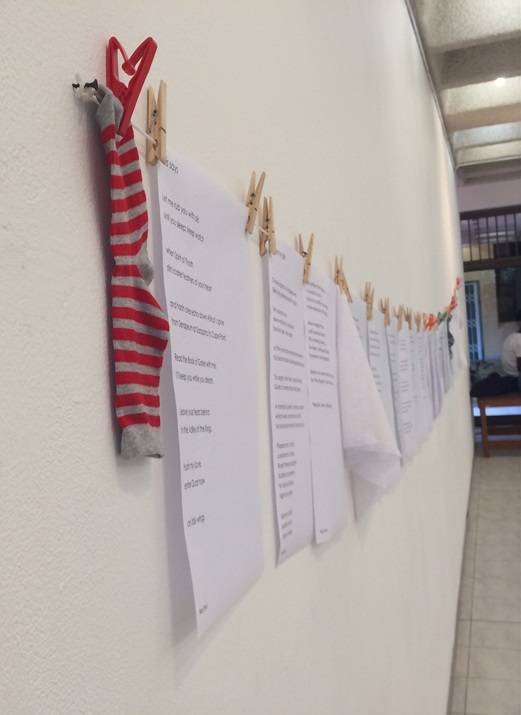Marí Peté (nèe Greyling) (1964 – ) was born in Middelburg (Mpumalanga province) and grew up in Witbank, where she matriculated at Hoërskool Patriot (named after the first Afrikaans newspaper founded in 1876).
While studying at the University of Pretoria, her first Afrikaans poems were published in Tydskrif vir Letterkunde. She moved to Durban in 1987 where she studied an Honours degree in Afrikaans and Dutch literature at the then University of Natal.
She taught Afrikaans second language for four years at several secondary schools in Durban, across the divides of the segregated education system of the time. She also studied part-time for a Further Diploma in Education and requalified as a teacher of computer programming. During this time, Marí wrote a series of poems about Durban (all in Afrikaans, some of them with English titles only): “free the beaches”, “just another day in paradise”, “somer”, “buiteseisoen”, among others.
Marí lived in Wolfson College, Cambridge from 1991 to 1992, with her husband Stephen who studied his Master’s at the University’s Criminology Institute. Steve and Marí began to translate some of her Afrikaans poems into English during this time, to be able to communicate with a broader audience. Poems from this period attempt to capture the tensions between her tranquil and dreamy existence (while working for the University’s Faculty of Modern and Mediaeval Languages), and the build-up to the first democratic elections back home in South Africa. Most prominent perhaps is the poem “halfronde”/“north and south” which appears in full further down.
Marí returned to Durban at the beginning of 1994 when she started working at the Durban University of Technology as learning technologist, managing a multimedia learning lab for maths, science and English. Studying part-time for a Master’s in Computer-assisted Education (Pretoria University) equipped her to become an eLearning specialist, when the Internet became widely accessible in South Africa. In 1998 her daughter Megan was born and in 2002, her first poetry collection begin was published by Umsinsi Press. A few English poems in this book marked the beginning of bilingual writing, while translations mentioned earlier were printed with their original counterparts.
In 2007, a second collection, Amytis, was published by Umsinsi Press. The majority of poems in this book were written in English, and a few in Afrikaans. “Durban Taxi” and “Umgeni Road” are poems written while driving between the seven campuses where she provides eLearning support to academics.
A series of poems on her experiences with technology in higher education appear in her third collection Step Through, published in 2016 (Leopard Press). Also, another Durban street poem, “Warwick Junction”, was shortlisted for the Sol Plaatje EU Award. Marí began to experiment with writing English and Afrikaans versions of a poem simultaneously.
http://maripete.co.za
Photo’s from “Step Through – a Pop-up Performance of Poems”
The Gallery of the Durban University of Technology
February 2016
“Marí Peté’s presentation is imaginative, with a whimsical quality and a touch of pathos.”
— Brian Pearce
The poet steps us through imaginary spaces wherein she speaks her poems. She uses transitional musical snippets, playing out elements from the poems — pegging delights, dreams and sorrows alongside exhibited sketches and poems.



Selected Work
From Begin:
HALFRONDE
kyk hoe die son aan die blare lek
sag soos ‘n kwas
gedoop in amper-rooi
die dae slyt
duim vir duim
sonloser september
ek soek soggens ‘n venster
om tee te slurp
saam met ‘n mad hatter
en ‘n muis
kraak die eerste blare
onder kousvoete
snuif aan skoorstene
en ander gerugte in die lug:
suid bloei die bome
sneeuwit verskroeide skelette,
in die strate breek lentereëns oop —
trane van ‘n mock turtle
oor lywe wat bid en bedel
om ‘n wonderland
waar woorde
waar word
(2 September 1993
Nasionale Vredesdag,
Suid-Afrika)
Translation:
NORTH AND SOUTH
the sun has touched the leaves
soft dipped brush
september days shrink here
inch by inch
I sip morning tea
by the window
with a mad hatter
and a mouse
scrunch the first leaves
beneath my socks
sense signals
from chimneys above:
in the south
trees blossom
bodies burn
in streets
tears of a mock turtle,
spring rains down
on those who beseech and pray
for wonderlands
where words
come true
(2 September 1993
National Peace Day,
South Africa)
From Amytis:
UMGENI ROAD
piesang transport
pakistani take away strictly halaal
surgery jj moodley dokotela
gearbox & diff exchange
mazinov house
space television
joosab’s supermarket
chacha’s pawn shop
nabibya’s fast food
suspension&alignment
jockey the next best thing 2B naked
it’s time to ruffle your feathers
we deliver
royal vulcanizing
minty’s mad tyres and mags
krash panel beaters
fatima’s famous foods
zak’s surprise butchery
bath&vanity surrounds
replacement body parts
fashion station
rust proofing
hansas body craft
port natal paint
bang bang payphones
azb halaal bunnies
mutton veg hot pies
living waters mission
swiss stone masons
sipsy’s hardware
d maharaj dental surgeon
free customer parking
local services only
phoenix motorglass
bamatshe amathuna
rega religious-cultural society
buy-a- brick: ticket R2
win-a-TV
in aid of funds to build a hall
dear customer we apologise for any
inconvenience caused during
road construction, business as usual
crankshaft grinding block reboring
head overhauls canrod resizing
skim while you wait
gearboxes and difs
hot meals served
karam’s food we are moving
bhoola optician
mo’s centre
benji dog chunks taste and freshness
guaranteed factory prices
auto smash workshop
crazy special meaty bones
biltong hot chicken chaka laka
braai wors R2.99
prime cut meats special offer
boats rubber ducks jetskis & accessories
if not supply store
chappies take away
indawo ka dokotela
silveray tea room
fuck all you
brittania spares 4 africa
safety footwear gumboots & rainwear
daily soap
carlton strong… & gentle
(For Allan Horwitz & Ike Muila, for introducing me to Isicamtho (tsotsitaal) poetry
10 June 2004)
From Step Through:
WARWICK JUNCTION
Down by the crossing he waits for the light –
it turns green. He looks left, then right,
revs to go…but oh, a river of women
(in which he fears he could drown)
wells up towards his yellow bike:
They are not afraid!
Bodies sway in patterned cloth,
bananas bunched on heads,
babies on backs, beaded necks,
cell phone gossip and song.
Johnnyboy says a prayer
before he is flattened
by such sisterhood
but in the nick of time (as if
struck by a kierie) the river parts,
a delta flows around him:
his fear dissolves
in smells of soap,
ginger root, and love
on balmy nights.
Further down where bunny chows are sold,
old apartheid stories told, the stream
snakes round, away…
Johnnyboy blinks,
revs his bike. The light
turns red again.
*
(Kierie: walking stick (Afrikaans)
Bunny chow: half or quarter loaf of bread hollowed out and filled with curry. The bread serves as an edible plate.
Warwick Junction lies on the edge of the Durban’s inner-city. On an average day the area accommodates 460 000 commuters, and at least 6000 street vendors. http://www.marketsofwarwick.co.za)
Bibliography
2002. Begin. Malvern: umSinsi Press.
2007. Amytis. Malvern: umSinsi Press.
2015. Step Through. Kloof: Leopard Press.
EDITOR OF:
2007. Look at me. Women Artists and Poets Advocate Children’s Rights. Art for Humanity. Durban University of Technology. (With Bianca Bothma)
POEMS APPEARED IN THE FOLLOWING LITERARY JOURNALS:
New Coin, New Contrast, Carapace, Botsotso, Fidelities, Tydskrif vir Letterkunde
POEMS APPEARED IN THE FOLLOWING ACADEMIC PUBLICATIONS:
Qualitative Inquiry (SAGE);
Quinlan, K.M. (Ed). 2016. How Higher Education Feels. Commentaries on Poems that Illuminate Emotions in Learning and Teaching. Sense Publishers.







